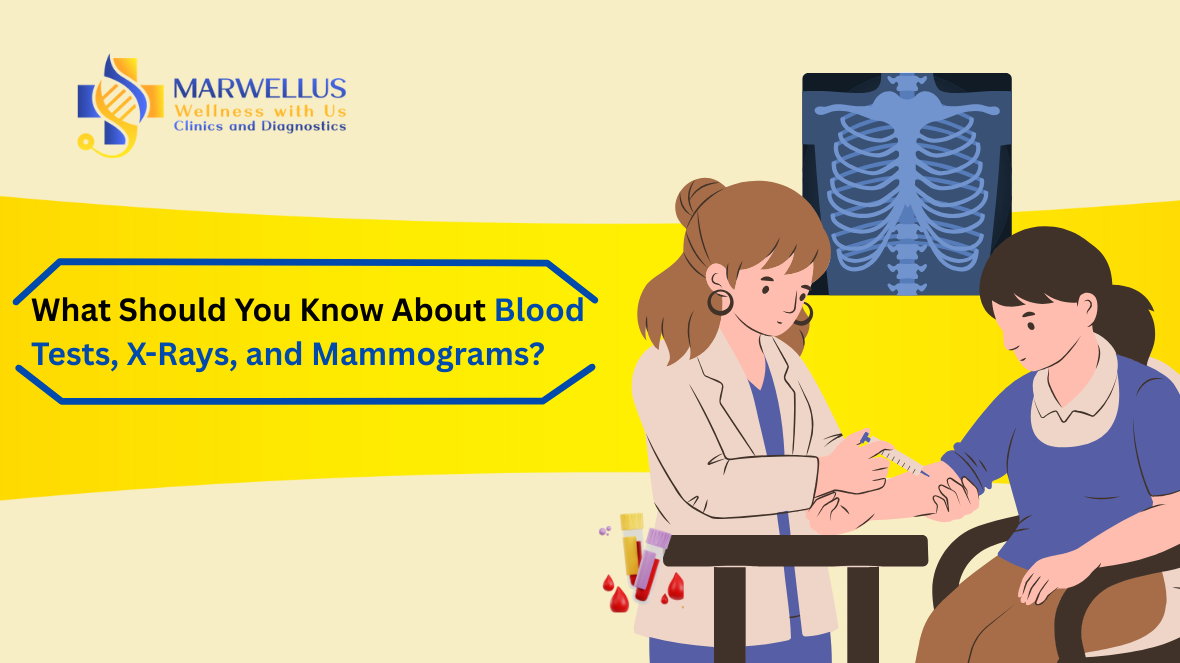



Did you know that routine blood tests, X-rays, and mammograms can detect health conditions before symptoms appear? Regular health screenings are fundamental for early detection, which can dramatically improve treatment outcomes and save lives. In this blog, we’ll provide essential information about three common diagnostic tests: blood tests, X-rays, and mammograms, and explain how they can help maintain your health and detect potential issues prior to them becoming serious.
Blood tests are diagnostic procedures that analyse a sample of your blood to analyse various aspects of your health. They can detect conditions like infections, anemia, cholesterol imbalances, and diabetes. Blood tests are essential for finding out underlying health issues that may not show symptoms, helping doctors diagnose conditions early and begin treatment sooner.
Periodic blood tests are a cornerstone of preventive healthcare. By measuring levels of various substances in your blood, such as glucose, cholesterol, and red and white blood cells, doctors can detect potential problems like heart disease, diabetes, or liver dysfunction before they manifest as noticeable symptoms. Regular blood tests play a critical role in saving lives via early detection and proactive management.
X-rays are a form of diagnostic imaging that uses radiation to create images of the inside of the body. They are primarily used to examine bones and detect fractures, but X-rays are also crucial for identifying other health issues, such as lung conditions, tumors, and infections. X-rays are commonly used to diagnose diseases like pneumonia, arthritis, and even certain cancers.
For high-risk individuals, such as smokers, X-rays can help detect early signs of lung disease, including lung cancer. Routine X-rays are essential in monitoring ongoing health conditions and ensuring that any potential issues are identified early, improving treatment outcomes and reducing the severity of diseases.
Mammograms are specialised X-rays used to detect breast cancer, often before physical symptoms appear. Regular mammograms can identify abnormalities such as lumps or tumors, allowing for earlier intervention and higher survival rates. The American Cancer Society recommends that women begin mammogram screenings at age 40 and continue annually or biennially thereafter.
Mammograms play a crucial role in women's health by detecting breast cancer in its earliest stages, even when it’s too small to be felt or noticed. Despite common myths about the discomfort of mammograms, the process is quick, and the benefits of early detection far outweigh any temporary discomfort. Regular mammograms save lives by catching cancer early when treatment options are more effective.
Always consult your healthcare provider for personalised advice on how often to schedule these important screenings.
Blood tests, X-rays, and mammograms are all critical components of preventive healthcare. Periodic health screenings allow for the early detection of diseases and enhance the chance of successful treatment. These tests not only help diagnose diseases but also assist in monitoring ongoing health conditions, ensuring that any changes in your health are identified and addressed promptly.
Early detection through routine screenings leads to more effective treatments, a better quality of life, and reduced long-term health risks. Regular health checkups should be a priority for everyone, regardless of age or health status, as they give valuable insights into your overall health and well-being.
Routine blood tests, X-rays, and mammograms are necessary for maintaining sound health and detecting potential problems early. By scheduling these routine screenings, you take an active role in addressing your health and making sure that any problems are addressed before they become serious. Stay proactive and make these tests part of your regular health checkups.
Don’t wait for symptoms to appear; start acting today. Schedule your blood tests, X-rays, and mammograms at Marwellus Clinic & Diagnostic Centre for early detection and peace of mind. These simple screenings can help identify potential health problems before they become serious, allowing for timely intervention. Contact us today to schedule your appointment and stay proactive about your health!